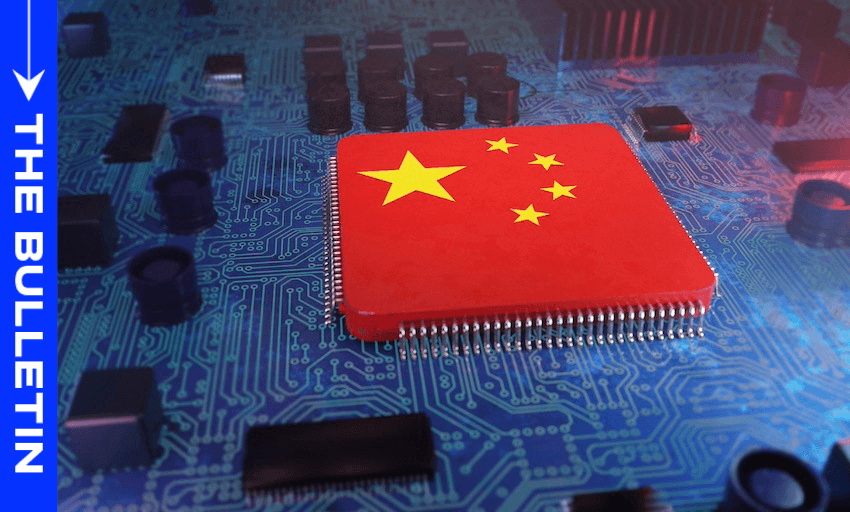Accusations that China-backed hackers accessed MPs’ data come as the UK and US make allegations of their own – and issue arrest warrants, writes Catherine McGregor in this excerpt from The Bulletin, The Spinoff’s morning news round-up. To receive The Bulletin in full each weekday, sign up here.
Chinese hackers accessed MPs’ data
Chinese state-sponsored cyber-spies targeted New Zealand’s parliament in 2021, accessing data on MPs, GCSB minister Judith Collins revealed on Tuesday. The hack has been identified as the work of Advanced Persistent Threat (APT) 40, a group allegedly linked to China’s Ministry of State Security. Collins said NZ’s Parliamentary Counsel Office and the Parliamentary Service were targeted, and while the accessed data wasn’t strategically sensitive, the incident underscores the threat to cybersecurity posed by hostile foreign actors. It’s not the first such incident. “In 2021, former GCSB Minister Andrew Little condemned the Chinese Ministry of State Security for its malicious cyber activity, in a separate incident to the revelations from Collins today,” the Herald reports. “APT 40, the same group named today, was said to be responsible for the incident.” Then, just six months ago, a SIS threat assessment warned about “ongoing activity in and against New Zealand and our home region that is linked to the [China’s] intelligence services”.
A diplomatic minefield for Luxon
China has denied the most recent allegations. The embassy said NZ was “barking up the wrong tree”, and suggested it was influenced by similar claims made recently by the US and UK. While key ministers condemned China’s actions yesterday, they didn’t speak as strongly as they could have, writes BusinessDesk’s Pattrick Smellie (paywalled). It “spoke volumes” about how NZ seeks to straddle its trading relationship with China and the growing need to push back on Chinese intelligence and influence campaigns, he says. In the Herald (paywalled), Audrey Young says PM Chris Luxon judged the response perfectly. “It required delicate diplomacy and he delivered.” The Post’s Luke Malpass calls the government’s decision to go public “brave and risky”, noting it could have decided to stay quiet about the attack instead. Stuff’s Tova O’Brien, on the other hand, thinks it shows up our “co-dependence” on our allies. “Two and half years it sat on this information that China had attacked our democracy. And it only chose to go public after the United States and United Kingdom had gone first… Coincidence? No.”
Election candidates targeted by foreign actors
Coincidentally enough, yesterday also saw the annual select committee appearance by the heads of NZ’s two spy agencies, the GCSB and SIS. Incidents of foreign interference discussed by the spy chiefs included “deceptive, covert, corruptive” actions by state actors attempting to influence candidates in last year’s election, Stuff’s Glenn McConnell reports. SIS boss Andrew Hampton said in some cases the SIS had worked with candidates to help them become aware of these interference attempts, and it was “highly unlikely” that the election result had been impacted in any way. He also said the SIS had discovered that seven NZ pilots had been involved in training Chinese army aviators. “Such activity clearly poses a major national security risk and it is not in New Zealand’s interests to have former military personnel training another military who does not share the same values as our own.”
UK and US impose sanctions, make arrests over own hacking claims
The revelations about espionage inside the NZ parliament came just hours after the UK and US imposed sanctions against a Chinese company linked to the hacking group nicknamed APT 31 (APT names are used by Western security officials to identify hacking groups linked to foreign governments, the Guardian explains). The UK alleges that Chinese state-sanctioned hackers targeted the Electoral Commission, potentially gaining access to information on tens of millions of UK voters, and conducted cyber “reconnaissance activity” against British parliamentarians who were critical of Beijing in 2021. Meanwhile the US government accused China of perpetrating an elaborate state-backed hacking programme for more than a decade, and charged six hackers with conspiracy to commit computer intrusions and wire fraud as a result.
